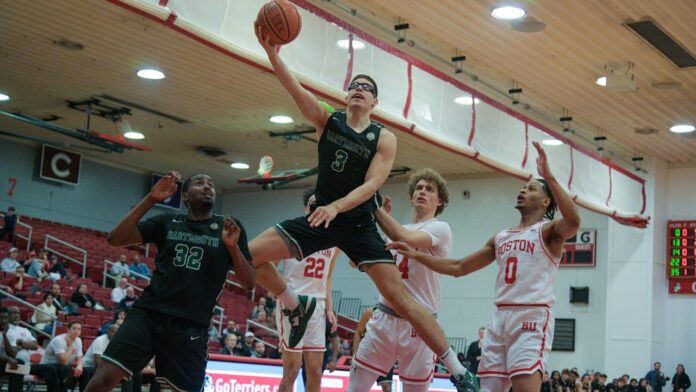In a historic decision that could change the relationship between Division I college athletes and their schools, an NLRB’s regional director Monday ordered a union election for Dartmouth’s men’s basketball team.
Laura Sacks of Region 1 (Boston) determined the players are employees under the National Labor Relations Act (NLRA) primarily because the players perform work in exchange for compensation. The players, in other words, are students and employees.
Dartmouth can and is likely to request the agency’s board in Washington, D.C., conduct a review of Sacks’ order, setting in motion an appeal process that could last several years and eventually end in front of the U.S. Supreme Court.
Prior to the review, the players are able to vote on forming a union. They would be represented by SEIU Local 560, a union that represents other Dartmouth employees—including the players’ classmates who work in dining services.
Dartmouth argued that because courts have rejected the recognition of college athletes as employees, the NLRB should as well. The U.S. Court of Appeals for the Ninth Circuit (Dawson v. NCAA, 2019) and the Seventh Circuit (Berger v. NCAA, 2016) reasoned that college athletes are not employees because their primary relationship to their schools is academic, and they lack an expectation of income.
Sacks was unpersuaded, stressing “the basketball players at issue here perform work which benefits Dartmouth.” Sacks also noted she’s “not bound” by conflicting decisions in federal courts of appeal. Dartmouth will likely resurface these arguments in an appeal to the agency board in D.C. and hope they have more traction there.
Sacks isn’t the first regional director to find a Division I team are employees of their school. In 2014, Peter Ohr, then the NLRB’s Chicago regional director, reached the same conclusion with respect to Northwestern football players. The school successfully appealed to the agency’s board, which voted 5-0 for the university on grounds the recognition of some college athletes as employees but not others would not be workable; the NLRA only governs private employers (including private colleges) whereas athletes at public universities are governed by applicable state labor laws. The board at the time also suggested other branches of government, such as Congress, ought to consider the issue.
Since then, Congress has taken no action, despite holding hearings. Meanwhile, multiple courts have criticized amateurism in college sports, most notably the U.S. Supreme Court in NCAA v. Alston (2021). It’s possible the board will view the subject differently a decade later, in an era where judges have openly rebuked NCAA rules and college athletes can earn income through NIL.
College athletes at Dartmouth and other D-I programs have reported spending more than 40 hours per week for sports, scheduling courses so they do not interfere with their team, submitting timecards and performing fundraising work where they are instructed to meet with potential donors. These and other factors have suggested they are functioning as employees.
While Dartmouth’s basketball players, unlike many Northwestern football players, do not receive athletic scholarships, Sacks said that they still receive plenty of benefits, including equipment and apparel, academic support and sports psychology, that sets them apart from other Dartmouth students. Regardless of whether the value of these benefits was less than that of a full scholarship, the players “perform work in exchange for compensation,” Sacks determined.
She similarly concluded that the players’ employee status did not rest on how much (or little) money the basketball team made.
“While there is some factual dispute as to how much revenue is generated by the men’s basketball program, and whether that program is profitable, the profitability of any given business does not affect the employee status of the individuals who perform work for that business,” she wrote.
Should Dartmouth players eventually enter into collective bargaining with their school, one advantage for the school is negotiated terms—not only for pay but for health care and work reimbursements—would be immune from antitrust scrutiny.
Employment recognition would carry tax consequences, too. “If players become employees,” PFK O’Connor Davies Sports & Entertainment Group Director Robert Raiola told Sportico, “they would not be able to deduct agent fees, and they also would be subject to social security and Medicare taxes.”
Cade Haskins and Romeo Myrthil, the player representatives, issued a statement saying they and their teammate are “thrilled about the positive ruling” and “excited to see how this decision will impact college sports nationwide.”
Haskins and Myrthil also anticipate other college athletes “will be inspired to follow suit” and possibly seek employment recognition. To that end, they plan form an “Ivy League Players Association” for basketball players in the Ivy League. The association would aim to “foster unity, advocate for athletes’ rights and well-being, and create a platform for collaborative decision-making.”
(This story has been updated throughout with details of NLRB structure and a quote from player representatives.)

